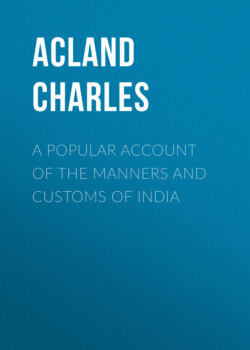Читать книгу A Popular Account of the Manners and Customs of India - Acland Charles - Страница 5
На сайте Литреса книга снята с продажи.
Bishop's Palace, Calcutta, July 15.
ОглавлениеTable of Contents
WATERSPOUT.
Here we are arrived safely at this place, after a very disagreeable voyage, the worst part of which was the travelling up the river Hoogly. We were becalmed for some time, and merely drifted up a few miles a-day with the tide. However, I was much interested one day by watching a cloud, which, after moving and whirling about for a little time, began to send down a little thin point towards the river. Presently the column increased in size, while underneath the waves seemed to rise to meet it; and when they had done so a great quantity of the water was sucked up by the cloud, which grew larger in consequence, and then steered away towards the land: this was a waterspout.
The place in which we live—that is, our hotel—is a large house, three stories high, surrounding a square, and on each side are forty-two windows in a row.
Immediately after landing I went to pay my respects to the archdeacon, and to inform him of my arrival. Not finding him at home, I proceeded to the bishop, who treated me very hospitably, and invited us to his house.
BISHOP'S PALACE.
On returning home I found that during my absence the archdeacon's wife and daughter had been calling on my wife, for the purpose of inviting us to their house; but having already accepted the offer of the bishop, we, of course, were compelled to decline this. In the bishop's palace we have two very large apartments assigned to us, besides a bath-room, and a verandah, about three hundred yards long, to walk in. I was scarcely located here, however, before I received an order to proceed to Gowhattie, in Assam, and to assume the clerical superintendence of the whole province. At Gowhattie there is one European lady, and there are five European gentlemen, who are the only ones within two hundred and seventy miles. My parish, if such it can be called, is about twice the size of England, and I shall be continually travelling about.
But I must now tell you something about this place. The principal animals here are buffaloes, elephants, and tigers, of whose numbers you may form an idea by the fact of the Government having offered a reward for every tiger's head. Last year, in the province of Assam, the number of heads brought in was two thousand six hundred, and yet these animals seem to be as numerous as ever.
We shall have to travel in a little boat, called a budjeon, with two cabins, up to Gowhattie. The boatmen are black, and we shall be the only passengers on board. We must be provided besides with two other boats, the one with the fowls and goats in it for cooking, and the other with the luggage. We shall be rather more than two months on the voyage, and must take with us enough provisions for a year. When we reach Gowhattie the boat must serve us for a home until we have built one with mats and reeds.
There are some large birds here called adjutants, about five feet high, with long white legs, black bodies, bare necks, and a beak like pelicans. They are generally seen perched on the tops of houses. The fire-flies are very pretty: on a fine night a number of them are seen flitting about the lanes and gardens glittering like stars.
The bull-frogs make a noise at night almost as loud as the bark of a dog. A pretty brown and white bird is to be found here, singing much like a blackbird; it is called a miner.
Calcutta is well termed the city of palaces, since every house is a noble mansion. Most of the rooms are at least fifteen feet high and twenty-six feet square, and along every story there is a verandah, supported by stone columns. The language of the people here seems to have retained many traces of the Portuguese, who were here before the English. For instance, the bishop is called de Lord Padre, and I go by the name of Padre Sahib.
